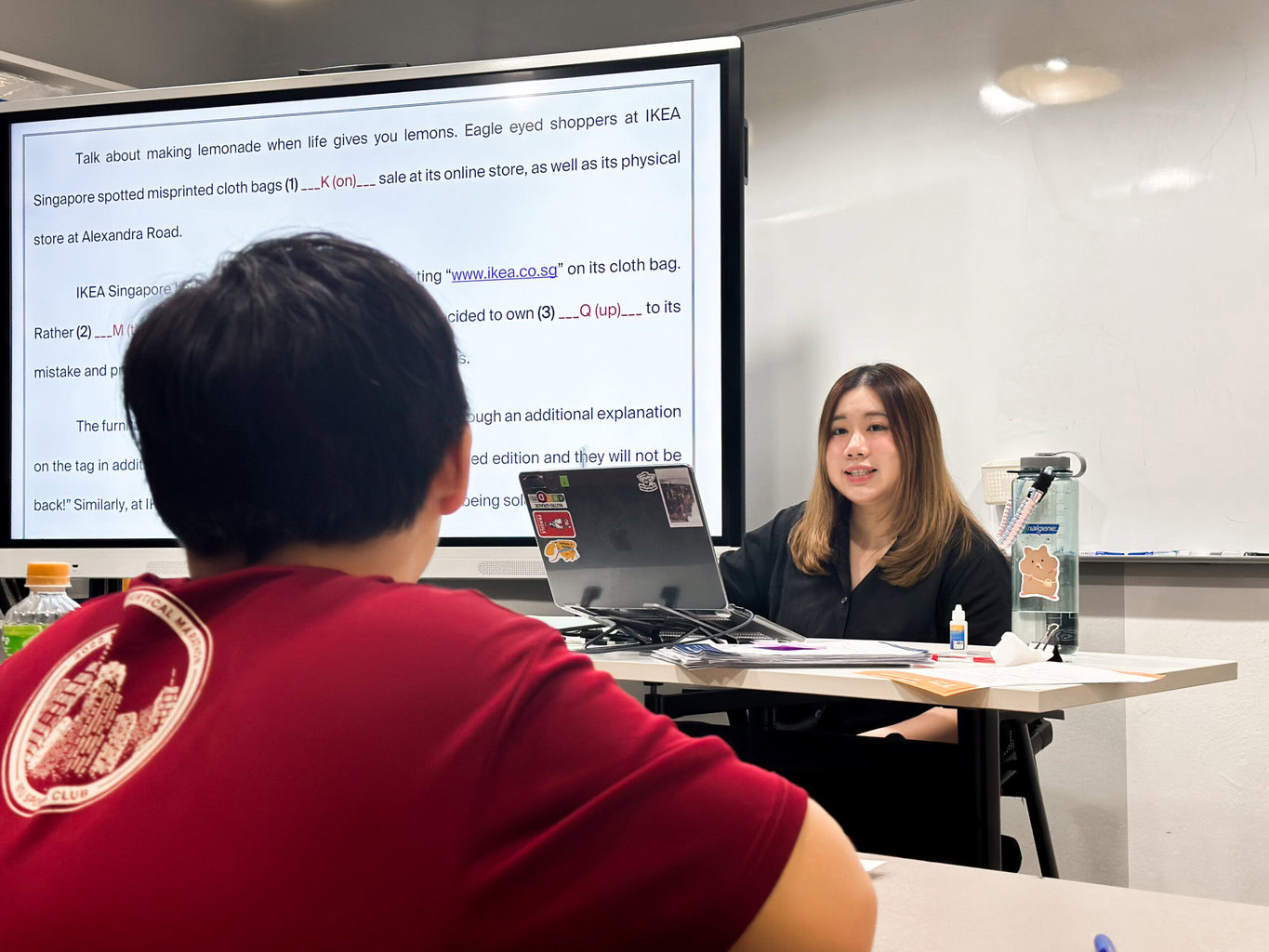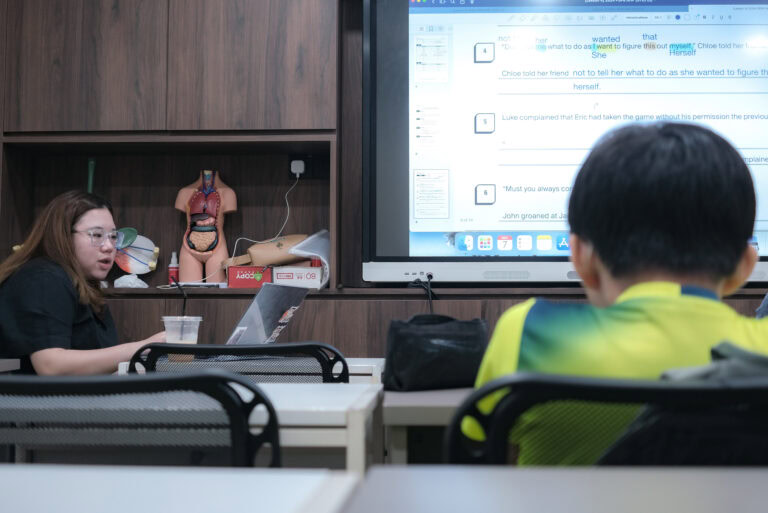Sentiments from the ground following the PSLE English written papers indicated that it was easier than expected. With 2023 marking a return to life before COVID, there was an expectation among many that the papers would revert to their typical difficulty level, which was last seen in 2019. However, contrary to expectations, the 2023 English papers were in fact, significantly more manageable than the pandemic years. Nevertheless, challenging questions which were meant for distinguishing the AL1s and AL2s were still present. Ultimately, in order to score for English, the defining sections that students will need to do well for are: Continuous Writing, Grammar related sections and Orals.
Let’s take a look at some of the sections and questions tested in the 2023 PSLE.
1. Paper 1: Continuous Writing
The topic for 2023, “A Change for the Better,” might have given students a mini heart attack when they first read the topic due to its uniqueness, as it is in the form of a longer phrase, which was last seen in the 2020 PSLE, “Something That Was Lost.” Nonetheless, 2023’s topic can be considered to be more manageable than 2022’s, “A Long Wait,” as once students break down the topic, they would realise that the direction that they need to take for the story is nothing that they have not encountered before.
Successful compositions likely demonstrated a clear elaboration of the “change” element, portraying both the before and after, along with meaningful character development. Additionally, it is imperative that a negative situation should be presented before the change and that the story should end on a positive note, even if not entirely. For TTA students, using our signature One Storyline Approach would have comfortably gotten them past the line. Notably, the use of the “Snail Boy” storyline was popular among our students due to its impeccable fit with the topic and pictures.
Year after year, we see the power of our One Storyline Approach. Indeed, the best strategy to tackle continuous writing is to arm students with a number of flexible storylines. Teach them how to adapt those stories and regardless of what gets tested in the PSLE, students should breeze through the paper.
Watch this video to see how the “Snail Boy” storyline can be adapted into the 2023 composition topic.
2. Paper 2 (Booklet A): Vocabulary Cloze
If there’s anything that the past two years’ PSLE papers have shown us, it is that the trickiest question of the English paper seems to appear in the Vocabulary Cloze section more often than not. Let’s have a look at what our English team has identified as the most difficult question of Paper 2.
Q18: My curiosity soon got the better of me.
Options: overtook, outwitted, outweighed, overwhelmed
Q18. My curiosity soon got the better of me.
1. overtook
2. outwitted
3. outweighed
4. overwhelmed
Answer : 4
To get the better of (someone) means that you cannot stop yourself from allowing that feeling to make you do something. The options “overtook” and “overwhelmed” were close contenders for the final answer, but “overwhelmed” was the correct choice as it best captures the meaning of the phrase, considering that “overtake” is typically associated with negative emotions such as “fear overtook me”.
3. Paper 2 (Booklet B): Editing
Q39: Grandma had a pair of glasses which she had worn for over a deckaid.
Answer: decade
Q41: Even with her glasses, she could hardly make out the feechers on my face when I stood in front of her.
Answer: features
Q43: In spite of Grandma’s rilarktence, I insisted that she should get her eyes checked.
Answer: reluctance
Q44: Grandma was vezeebli upset as I held her hand and slowly led her to the bus stop.
Answer: visibly
Q45: On the bus, I took the window seat and told her about the seeneri outside.
Answer: scenery
Q48: Grandma gave an orkuard smile upon hearing that.
Answer: awkward
For the editing section, it came as a surprise that the difficulty level was significantly reduced. With a total of 12 grammar and spelling errors, six errors respectively, correcting spelling mistakes often prove to be challenging for students. However, in the 2023 paper, the spelling errors were of little resemblance in difficulty compared to the past five years. While it may not have been as tough, the questions are not without its challenges as demonstrated especially in Q45 and 48. Students tend to misspell it as “scenAry” and “awkward” may not have be the easiest of spelling for weaker students. What this however reflects, is that students should continue to practise spelling commonly used words and to have their own system to track words that they tend to misspell or are confusing. It is also crucial that students do not excuse themselves whenever they make spelling mistakes in their daily work. Instead, one should aim to practise spelling it until the correct spelling becomes ingrained in their muscle memory.
4. Paper 2 (Booklet B): Comprehension Cloze
Without a doubt, comprehension cloze can be a killer section for students who do not read widely. We are not going to sugarcoat it, the comprehension cloze is ultimately a test of a student’s vocabulary and those armed with a wide repository of it often find themselves in a better position to score. Fortunately, the 2023 passage was on the whole, still manageable.
Some of the trickier questions we thought were (parts marked out in yellow are the clues for the question):
Para 1, Q52
Traveleys, a British company, was set up with the (Q51) aim of helping visually impaired travellers visit different parts of the world by pairing them with guides who have (Q52) perfect/excellent sight. The guides who can see well therefore (Q53) become the “eyes” of the travellers with visual impairment.
For Q52, most students were able to figure out that the visually impaired are paired with guides who can see. However, the challenge lies in finding the most appropriate collocation for “sight” in context. It is recommended that students avoid using imprecise and relative terms such as “good” sight. Furthermore, the recommended answer provided by SEAB is “perfect”, so we can safely assume that there was a high probability that markers did not accept “good” as an answer. A tip from us for this question is to change the word “sight” to “eyesight” which could have helped in guiding students to the best answer.
Para 2, Q56
How do travellers with visual impairment “see” a place? (Q56) All it takes is teamwork between them and the sighted guides.
Q56 tested students’ knowledge of their idioms. The idiom, “all it takes” means all that is required or necessary. Some students might have chosen the word “what” instead but they were likely to be thinking of this idiom, “have what it takes (to do something)”, which means to have the qualities or character needed to be successful.
Para 3, Q63
One of them mentioned that she had learnt important (63) values such as humility and determination from partnering the visually impaired travellers.
For Q63, students would have to select an appropriate category that encompasses “humility and determination”. These are examples of values, which are the fundamental ideas or beliefs people have that guide and control their behaviour. “Traits” or “qualities” would not work as they refer to the noticeable features or personality that a person possesses.
While the comprehension cloze may appear to favour those who have a wide range of vocabulary, it’s important to note that students with weaker vocabulary skills can still achieve a decent score. At Think Teach, we equip our students with strategies to discern contextual clues and recognise various types of blanks to help them derive a logical answer. Furthermore, we give students ample comprehension cloze exercises which expose students to diverse word pairings and its usage. Nonetheless, our recommendation will still ultimately be for your child to read widely should they want to excel in this section.
5. Paper 2 (Booklet B): Synthesis & Transformation
If anything, 2023’s S&T was far from tough. In recent years, this section has been challenging due to word transformation questions. A good example of how challenging it can get would be 2021 and 2022’s PSLE paper. However, students would likely have heaved a huge sigh of relief to find the 2023 synthesis questions relatively straightforward, even for the word transformation question. In Q69, students were tested on whether they were able to change from advise (verb) to advice (noun), a simple and commonly tested word form. A note from us is that while it was manageable, there were no repeated question types tested for the 2023 paper, which was last seen in the 2020 PSLE paper. Students were tested on gerunds, conditionals, adverbs, word transformation and direct and reported speech. Thus, it is crucial to note that the PSLE continues to test a wide range of rules and question types, so it is important that students do not bank on spotting questions but to expose themselves to a wide range of questions as well as maintaining a high level of meticulousness while attempting S&T.
A gerund is a word ending in “-ing” that is made from a verb and used like a noun. Gerunds are used after a preposition, as a noun or after a phrasal verb.
Example
Ashley saw her best friend. She ran towards her and gave her a hug.
Upon seeing her best friend, Ashley ran towards her and gave her a hug.
In this question, upon is a preposition. Hence, it needs to be followed by a gerund. Q66 of the PSLE paper tested students on “instead of”. Since “of” is a preposition, students will need to use a gerund after it.
Conditionals are used to describe what could happen if a certain condition is met.
Example
Jerry cannot attend the concert. He does not have a ticket.
Jerry cannot attend the concert unless he has a ticket.
In order for the outcome to happen (attending the concert), the condition that needs to be fulfilled is that Jerry has a ticket.
Adverbs are used to modify a verb and can have different meanings. The PSLE tested on the conjunctive adverb of “however”. Our tip on how to answer such questions is to replace “however” with “no matter how”.
Example
Connor tried very hard. He still failed the test.
However (no matter how) hard Connor tried, he still failed the test.
Word transformation questions involve transforming word forms. For instance, changing from a verb to a noun.
Example
Kitty lost her wallet. She was saddened by it.
The loss of her wallet saddened Kitty.
To answer this question, “lost” (verb) needs to be transformed into “loss” (noun).
Except for the 2017 PSLE, direct and reported speech has been tested in every PSLE paper since 2015. This involves reporting what has been said. The basic rule of thumb is that students need to remember to change the following: Tense, Pronoun, Time and Place, or more fondly known as the TPTPs.
Example
“Where did you go yesterday?” Leon asked me.
Leon asked me where I had gone the previous day.
Tense: did go → had gone
Pronoun: you → I
Time: yesterday → the previous day
As we are reporting a question, the subject (I) needs to come before the verb (had gone).
6. Paper 2 (Booklet B): Comprehension Open-Ended
Whether the comprehension open-ended is challenging hinges on the number of inference questions present and the ease of searching for clues to the answers. Examples of tough comprehensions would include the 2019 paper with nearly every question demanding students to infer and the 2020 paper where clues for some of the questions were scattered across various paragraphs, adding to the difficulty.
The 2023 comprehension mirrored a similar difficulty seen in 2022, featuring only a handful of inference questions. Had students read the passage carefully, they would not have found the inference questions hard to answer. Success in this section typically relies on the student’s ability and willingness to meticulously source for clues, coupled with being precise in their answers. Thus, it is paramount that students employ close reading skills, make sense of the passage by making annotations, as well as to analyse the questions to determine what is required of their answers to ensure that they craft the most accurate and specific response.
7. Preparing for the PSLE
As the saying goes, if you fail to plan, you plan to fail. So, where do we begin? For a start, students should be clear of the examination format. Begin by reviewing past work to identify areas that require more work. Once it has been pinpointed, prioritise revising content. It is vital that students do not try to fly before learning how to walk. Rushing into practice papers or attempting questions prematurely is ineffective as one should solidify their understanding of the material before applying their knowledge through tackling questions.
As cliché as it may sound, do not be afraid to make mistakes! Mistakes are the best indicators of our learning gaps and being able to identify that is half the battle won. Lastly, do not hesitate to seek help when needed. While personal efforts are crucial and necessary, guidance from teachers or any form of available support can go a long way. Hence, do not shy away from asking for help!
8. Concluding Remarks
Much to the delight of many, the 2023 PSLE English papers were unexpectedly straightforward, for a year where we were no longer disrupted by the pandemic. However, this does not mean that we should rest on our laurels. Despite the relative ease of the 2023 paper, what this and past year PSLEs have continued to prove is that a solid foundation in the language, content mastery and examination skills remain the keys to success. At Think Teach, our results speak volume. For our 2023 cohort, 1 in 2 students attained AL1 or 2 and 80% of our students scored within AL1 to 4 for English. The success of our students reinforces the importance of laying a strong foundation, having the right materials, ample practice and a targeted revision plan.
This article was proudly written for you by TTA’s English Team. Every year, we impact over a thousand students and empower them with our smart techniques to achieve exam excellence in their school exams as well as their PSLE. We want your child to be our next success story! Together with us, your child can strengthen his/her mastery of paper 2 content by joining our Full English Programme (FEP). Additionally, your child can hone his/her composition writing skills by partaking in our Master Writing Classes (MWC).



